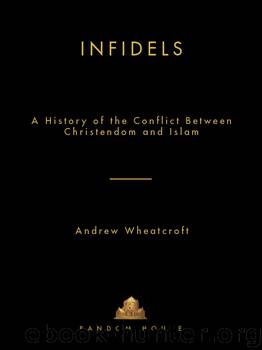Infidels by Andrew Wheatcroft

Author:Andrew Wheatcroft [Wheatcroft, Andrew]
Language: eng
Format: epub
ISBN: 978-1-58836-390-9
Publisher: Random House Publishing Group
Published: 2004-08-19T04:00:00+00:00
Then Lazar himself declared,
I’d rather shed my blood
Than draw near to or bow down
To the cursed and evil
Murderer, Hagar.13
The traditional language used about Islam since the seventh century—“Hagar,” “the cruel beast”—was the natural idiom to describe the Turks. The trope of triumph through martyrdom, where defeat was transmuted into a glorious victory, becomes a recurrent theme and inspiration for the Serbs’ future. The patriarch Danilo, in his late-fourteenth-century Narrative About Prince Lazar, summed up the future for the army of the Serbs in the face of their monstrous enemy: “We have lived for a long time for the world; in the end we seek to accept the martyr’s struggle and live for ever in heaven. We call ourselves Christian soldiers, martyrs for godliness to be recorded in the book of life … Suffering begets glory and labours lead to peace.”14
Such myths were first rooted in oral folktales. Later the account of these events was written down, but existed only in very few manuscript copies. In 1601, a Carthusian monk called Mavro Orbini in the Adriatic city of Ragusa (Dubrovnik) published the story of Lazar in Kingdom of the Slavs (Il regno degli Slavi).15 In 1722, on the orders of Peter the Great, this powerful advocacy of “the Slavic nation and language” was translated. 16 It was not, it seems, a full or faithful translation, but the Kosovo story had an increasing impact, especially among the Serb communities in the Habsburg lands whose ancestors had left in 1690.17
Balkan Muslim communities, although they did not use written or visual materials to the same degree as the Christians, also developed their sense of cultural identity. These Muslim communities were as deeply rooted in the land as their Christian counterparts, for most of them were the descendants of local converts and not of migrants. As a result, Islam in the region developed many characteristics not found elsewhere in the Islamic world. These lasted to the end of the twentieth century. It was considered “being Muslim the Bosnian way,” according to Tone Bringa, who interviewed Bosnians in the 1980s. She describes an incident during the mandatory fast of Ramadan (Ramazan), which in Bosnia was thought suitable for women and old men, who did not have to work hard.
One evening a couple had a rather typical dispute during Ramadan. The quarrel started when the wife urged her husband to come along for evening prayers in the mosque. It then developed into a row about past events of their twenty-year marriage, the husband asking his wife why she had not married a hodza [imam, or Islamic teacher] if that was what she wanted. He then summed up his miseries: “… I had no coffee all day and it is Ramadan, and [so] I may not drink brandy.”18
Download
This site does not store any files on its server. We only index and link to content provided by other sites. Please contact the content providers to delete copyright contents if any and email us, we'll remove relevant links or contents immediately.
The Secret Power of Speaking God's Word by Joyce Meyer(3220)
Signature in the Cell: DNA and the Evidence for Intelligent Design by Stephen C. Meyer(3138)
Real Sex by Lauren F. Winner(3023)
The Holy Spirit by Billy Graham(2953)
The Gnostic Gospels by Pagels Elaine(2531)
Jesus by Paul Johnson(2363)
Devil, The by Almond Philip C(2333)
23:27 by H. L. Roberts(2252)
The Nativity by Geza Vermes(2231)
Chosen by God by R. C. Sproul(2165)
All Things New by John Eldredge(2162)
Angels of God: The Bible, the Church and the Heavenly Hosts by Mike Aquilina(1969)
The Return of the Gods by Erich von Daniken(1946)
Angels by Billy Graham(1926)
Knowing God by J.I. Packer(1859)
Jesus of Nazareth by Joseph Ratzinger(1811)
The Gnostic Gospel of St. Thomas by Tau Malachi(1799)
Evidence of the Afterlife by Jeffrey Long(1790)
How To Be Born Again by Billy Graham(1782)
